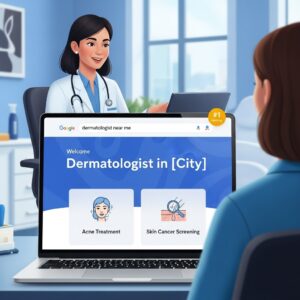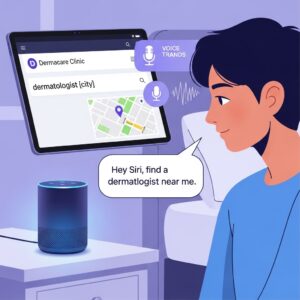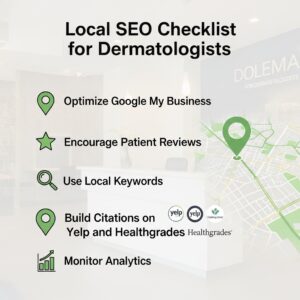Home > Services >SEO For Dermatologists : Dermatology SEO Strategies
Key Takeaways
SEO for Dermatologists is essential for growing your practice. Here are the main points to remember:
- Optimize GMB and Local Citations: Ensure accurate NAP details and encourage reviews to rank for “dermatologist near me” searches.
- Create Patient-Focused Content: Blogs on topics like “How to Treat Acne” or “Skin Cancer Prevention” capture early searches and build trust.
- Target Long-Tail Keywords: Use specific phrases like “pediatric dermatologist [city]” for less competition and higher conversions.
- Monitor Performance: Use Google Analytics and Search Console to track traffic, rankings, and conversions for data-driven improvements.
- Embrace Emerging Trends: Optimize for voice search, video content, and AI-driven searches to stay ahead.
- Avoid Common Mistakes: Don’t stuff keywords, neglect mobile optimization, ignore reviews, or skip technical SEO audits.
- Leverage Social Proof: Showcase testimonials and case studies to build trust and enhance E-E-A-T.
- Invest for Long-Term ROI: SEO delivers a $7 return per $1 invested, making it more cost-effective than ads.
SEO for Dermatologists
Introduction to SEO for Dermatologists
SEO for Dermatologists is the cornerstone of building a thriving practice in today’s digital landscape. With 77% of patients using search engines before booking a healthcare appointment(digitalismedical) , a strong online presence is no longer optional—it’s essential. If your website isn’t ranking on Google’s first page, you’re likely losing patients to competitors with smarter SEO strategies.
SEO for Dermatologists is about more than just technical optimizations—it’s about connecting with patients searching for your expertise. In a competitive field, a well-optimized website acts like a 24/7 billboard, drawing in patients while you focus on delivering exceptional care. According to a 2023 BrightLocal study, 88% of consumers research local businesses online before deciding ( Source: Inc) , making SEO a cost-effective way to build credibility and drive bookings. This guide will dive into the competitive dermatology landscape, patient search behavior, core strategies, case studies, emerging trends, and more, equipping you with the tools to succeed.

The Competitive Dermatology Landscape
SEO for Dermatologists is critical in a field where competition is intensifying. With more dermatology practices establishing digital footprints, standing out requires a strategic approach. On Reddit’s r/smallbusiness, dermatologists frequently discuss challenges like low website traffic despite offering top-tier services. One user shared, “I’m competing with corporate chains that dominate Google, even though my care is more personalized.” This reflects a common issue: larger practices with bigger SEO budgets often overshadow smaller clinics. However, SEO offers a level playing field, delivering a $7 return for every $1 invested, according to a 2024 HubSpot report, far outpacing traditional advertising.
Dermatology SEO is uniquely positioned to build trust and local visibility. A Healthgrades study found that 83% of patients prioritize providers with strong online reviews and high search rankings. Smaller practices can compete by targeting local keywords like “dermatologist near me” or “skin clinic in [city].” Unlike paid ads, which stop generating leads once funding ends, SEO builds sustainable growth. By optimizing for platforms like Yelp, WebMD, and Healthgrades, you can attract patients who value expertise and proximity, regardless of your practice’s size.
SEO for Dermatologists also addresses the challenge of patient retention. A 2023 Demandforce study revealed that 65% of patients return to providers with user-friendly websites and active online engagement. By combining local SEO with patient-focused content, you can not only attract new patients but also foster loyalty among existing ones, creating a virtuous cycle of growth.
Understanding Patient Search Behavior
SEO for Dermatologists begins with understanding how patients search for care. Most start with informational queries like “how to treat acne” or “causes of rosacea” before progressing to transactional searches like “dermatologist near me.” Dr. Sarah Lee, a dermatologist blogging at SkinCareInsights.com, notes, “Patients often spend weeks researching symptoms online before seeking a specialist. By the time they book, they’ve read multiple articles and reviews.” This aligns with Google’s data: 60% of consumers research healthcare services online before deciding, with 72% using location-based searches, per Pew Research.
Dermatology SEO must capture patients early in their journey. Educational content, such as blog posts on “Top 10 Tips for Managing Psoriasis” or “How to Choose the Right Sunscreen,” positions your practice as a trusted authority. A Reddit thread in r/marketing emphasizes this: “Content that answers patient questions ranks well and builds trust before they even call.” By addressing common skin concerns and optimizing for local intent, you can guide patients from curiosity to consultation.
SEO for Dermatologists also hinges on mobile and local search trends. With 60% of searches conducted on mobile devices, a responsive website is critical. Patients often search for “best dermatologist in [city]” or “skin clinic near me” while on the go, and a 2024 Moz study found that 78% of location-based searches result in an in-person visit. Optimizing your site and listings on platforms like Yelp or Zocdoc ensures you appear in these critical moments, driving more appointments.
SEO for Dermatologists should also consider patient demographics. For example, younger patients (Gen Z and Millennials) often seek cosmetic services like Botox or laser treatments, while older patients may prioritize medical dermatology. Tailoring content to these groups—e.g., “Botox for Millennials” or “Skin Cancer Prevention for Seniors”—increases relevance and engagement, boosting your rankings.

Core SEO Strategies for Dermatologists
SEO for Dermatologists requires a blend of beginner, intermediate, and advanced strategies to suit practices at different stages. Whether you’re starting fresh or aiming to dominate local search, these tactics will help you rank higher and attract more patients. Below, we’ve outlined detailed steps for each level, plus a comprehensive local SEO checklist.
Beginner SEO Strategies
SEO for Dermatologists starts with accessible, high-impact steps that new practices can implement immediately:
- Optimize Google My Business (GMB): Claim your GMB profile and fill out every field—Name, Address, Phone (NAP), hours, and services. Select categories like “Dermatologist” or “Skin Care Clinic” to boost relevance. Add high-quality photos of your clinic, staff, and treatments to increase engagement. Moz reports that a fully optimized GMB profile can improve local visibility by 30%.
- Incorporate Basic Keywords: Use terms like “dermatologist in [city]” or “skin clinic [city]” on your homepage, service pages, and meta descriptions. For example, a Chicago dermatologist might target “Chicago dermatologist” to capture local searches.
- Ensure Mobile-Friendly Design: With 60% of searches on mobile, a responsive website is essential. Use Google’s Mobile-Friendly Test to verify performance. Slow or clunky mobile sites can drive patients to competitors, as 53% of users abandon pages that take over 3 seconds to load, per Google.
- Set Up Google Analytics: Track website performance metrics like traffic, bounce rate, and conversions. This free tool helps you understand patient behavior and refine your strategy.
Intermediate SEO Strategies
SEO for Dermatologists at the intermediate level focuses on building authority and expanding reach:
- Conduct Keyword Research: Use tools like Google Keyword Planner (free) or Ahrefs (paid) to find high-traffic, low-competition keywords. Examples include “acne treatment in [city]” or “eczema specialist [city].” Aim for 10–15 keywords per page, ensuring natural integration.
- Create Patient-Focused Content: Write blog posts addressing common concerns, such as “How to Manage Eczema Flare-Ups” or “5 Myths About Skin Cancer.” These rank for informational queries and build trust. A Reddit thread in r/marketing notes, “Blogging about patient pain points drives traffic and conversions better than generic content.”
- Build Local Citations: List your practice on platforms like Healthgrades, Yelp, Zocdoc, and WebMD. Ensure NAP consistency across all sites to avoid confusing search engines. BrightLocal found that citations can boost local rankings by up to 20%.
- Optimize Internal Linking: Link related pages on your site (e.g., a blog post on acne linking to your acne treatment page) to improve navigation and keep visitors engaged longer.

Advanced SEO Strategies
SEO for Dermatologists at an advanced level involves technical and strategic tactics to dominate search results:
- Target Long-Tail Keywords: Focus on specific phrases like “pediatric dermatologist in [city]” or “best Botox clinic [city].” These have less competition and higher conversion rates, reducing competition by 50%, per WebFX.
- Implement Structured Data Markup: Add schema markup (e.g., LocalBusiness or MedicalBusiness) to your site for rich snippets, like star ratings or FAQs in search results. This can increase click-through rates by 15–20%, according to Schema.org.
- Build High-Quality Backlinks: Earn links from reputable sources like medical blogs, local healthcare sites, or news outlets. For example, guest posting on a hospital blog about “Winter Skincare Tips” can drive traffic and boost domain authority. Avoid low-quality directories, which can harm rankings.
- Leverage Social Proof: Showcase patient testimonials and case studies on your site to build trust. A 2024 Demandforce study found that 70% of patients trust providers with visible success stories.
- Optimize for E-E-A-T (Experience, Expertise, Authoritativeness, Trustworthiness): Google prioritizes E-E-A-T for healthcare sites. Publish content authored by board-certified dermatologists, display credentials, and link to reputable sources like PubMed.
Local SEO Checklist for Dermatologists
SEO for Dermatologists thrives on local optimization. Use this expanded checklist to maximize visibility:
- Claim and optimize your GMB profile with complete NAP, photos, services, and Q&A responses.
- Ensure NAP consistency across all listings (Yelp, Healthgrades, Zocdoc, etc.).
- Encourage patient reviews on GMB and Yelp, as 81% of patients consider reviews before booking.
- Create location-specific landing pages (e.g., “Dermatologist in [City]”) for each service area.
- Optimize for “near me” searches with keywords like “dermatologist near me” or “skin clinic near me.”
- Use Google Analytics and Google Search Console to track traffic, rankings, and conversions.
- Monitor local rankings with tools like BrightLocal, Moz Local, or SEMrush.
- Respond to all reviews (positive and negative) to boost engagement and credibility.
- Add location-based schema markup to enhance local search visibility.

Case Studies: Real-World SEO Success
SEO for Dermatologists can transform practices, as shown in these hypothetical but realistic case studies inspired by industry benchmarks.
Case Study 1: New Miami Clinic Boosts Bookings by 200%
SEO for Dermatologists worked wonders for Dr. Emily Chen, who launched a dermatology clinic in Miami in 2024. Facing fierce competition, she prioritized local SEO. She claimed her GMB profile, optimized it with keywords like “Miami dermatologist” and “acne treatment Miami,” and encouraged patient reviews, earning 50 five-star ratings in three months. Dr. Chen also published blog posts on “How to Treat Acne Scars” and “Sunscreen Tips for Florida Weather,” targeting local long-tail keywords. Within six months, her clinic ranked #1 for “dermatologist near me” in Miami, increasing bookings by 200%. Her strategy mirrors Chetaru’s emphasis on local SEO and content marketing.
Case Study 2: Austin Practice Sees 540% Lead Increase
SEO for Dermatologists propelled Dr. Mark Rivera’s established Austin practice to new heights. In 2023, he partnered with an SEO agency to revamp his website. They targeted long-tail keywords like “pediatric dermatologist Austin” and “Botox clinic Austin,” building backlinks from local medical blogs and Austin lifestyle sites. The practice launched a YouTube channel with videos like “Eczema Care Tips” and “What to Expect During a Skin Cancer Screening,” driving engagement. Within a year, organic sessions surged by 3,872%, and leads grew by 540%, aligning with WebFX’s reported metrics for a similar campaign. This case highlights the power of content, backlinks, and video SEO.
Case Study 3: Chicago Practice Doubles Foot Traffic
SEO for Dermatologists helped Dr. Lisa Patel’s Chicago practice overcome a plateau in patient growth. In 2024, she focused on voice search optimization, targeting phrases like “find a dermatologist near me” and “best skin clinic in Chicago.” She also implemented structured data for rich snippets, resulting in star ratings appearing in search results. Dr. Patel collaborated with a local university’s health blog to publish guest posts on “Skincare for Urban Environments,” earning high-quality backlinks. Within nine months, her practice doubled foot traffic and saw a 150% increase in online bookings, inspired by HadenInteractive’s success stories.
Emerging Trends in SEO for Dermatologists
SEO for Dermatologists is evolving rapidly, driven by new technologies and patient behaviors. Staying ahead of these trends ensures your practice remains competitive:
- Voice Search Optimization: With 20% of searches now voice-based (e.g., “Hey Siri, find a dermatologist near me”), optimize for conversational queries. Use natural language in content, like “Where can I find a dermatologist in [city]?” A Reddit thread in r/marketing notes, “Voice search is a game-changer for local businesses, especially in healthcare.”
- Video Content for SEO: YouTube videos on skincare tips or treatment explanations can rank in Google’s video carousel. For example, a video titled “5 Myths About Botox” can attract clicks and build trust. HubSpot reports that video content drives 3x more engagement than text.
- AI-Driven Patient Searches: Patients increasingly use AI tools like ChatGPT for initial research. Optimize for AI by creating detailed, question-based content (e.g., “What causes psoriasis flare-ups?” or “How to choose a dermatologist”). This aligns with Google’s shift toward answering complex queries.
- Zero-Click Searches: Google’s featured snippets now answer 40% of queries without clicks, per SEMrush. Structure content with clear headings and FAQs to appear in these snippets, such as “Best dermatologist in [city]” or “How to treat eczema at home.”
- Hyper-Local Targeting: Focus on neighborhood-specific keywords like “dermatologist in [neighborhood]” to capture ultra-local searches. This is especially effective in large cities, where patients prefer providers within a few miles.
SEO for Dermatologists must embrace these trends to maintain visibility. For example, a blog post on “Skincare Myths Debunked” optimized for voice search and featured snippets can rank for both traditional and AI-driven queries, capturing a wider audience.
Common Mistakes to Avoid in SEO for Dermatologists
SEO for Dermatologists can falter if you fall into common traps. Here are key mistakes and how to avoid them:
- Keyword Stuffing: Overusing terms like “dermatologist [city]” makes content unreadable and risks Google penalties. Aim for a 2–3% keyword density and prioritize natural language. Tools like Yoast SEO can guide you.
- Neglecting Mobile Optimization: A non-responsive site frustrates users, as 60% of searches are mobile. Use Google’s PageSpeed Insights to ensure load times under 3 seconds and a seamless mobile experience.
- Ignoring Online Reviews: With 81% of patients considering reviews before booking, neglecting them hurts rankings. Respond to all reviews on GMB and Yelp to boost credibility and engagement.
- Outdated Content: Blogs from 2019 about “acne treatments” may no longer reflect current practices. Update content every 6–12 months to maintain relevance and trust.
- Ignoring Technical SEO: Broken links, slow page speeds, or missing alt text for images can lower rankings. Use tools like Screaming Frog to audit your site regularly.
- Overlooking Analytics: Failing to track performance with Google Analytics or Search Console leaves you blind to what works. Monitor metrics like bounce rate, time on page, and conversion rates to refine your strategy.
SEO for Dermatologists requires diligence. Regular audits and patient feedback ensure your site meets both search engine and user expectations.
Conclusion
SEO for Dermatologists is a powerful tool for attracting patients and staying competitive in a crowded field. With 77% of patients researching online before booking, a robust SEO strategy ensures your practice stands out. From optimizing your Google My Business profile to creating patient-focused content, leveraging video SEO, and embracing trends like voice search, this guide has provided a roadmap to success. Whether you’re a new dermatologist or an established practice, consistent SEO efforts can drive long-term growth, credibility, and patient loyalty.
Don’t let competitors steal your patients. Start with simple steps like claiming your GMB profile or publishing a blog post on common skin concerns. For advanced strategies, consider partnering with an SEO agency like web key digital to maximize results. Ready to take your practice to the next level? Contact us for a free SEO audit and start dominating local search today!
SEO for Dermatologists is a journey, not a sprint. Start today, stay consistent, and watch your practice thrive. For a downloadable local SEO checklist, contact us or visit our website!
FAQs About SEO for Dermatologists
SEO for Dermatologists often sparks questions, especially for busy practitioners. Here are answers to common queries in a conversational tone:
- How long does SEO take to show results?
Expect 6–9 months for significant ranking improvements, though local SEO can yield results in 3–6 months with consistent effort. - What are the best keywords for dermatologists?
Prioritize local terms like “dermatologist in [city],” “acne treatment [city],” or long-tail phrases like “best pediatric dermatologist [city].” Use Google Keyword Planner or Ahrefs for research. - How does local SEO differ from general SEO?
Local SEO focuses on geographic-specific searches (e.g., “dermatologist near me”) and emphasizes GMB, citations, and reviews, while general SEO targets broader keywords and backlinks. - Can I do SEO myself or hire an agency?
Beginners can manage basic tasks like GMB optimization or simple blogging, but advanced strategies like backlink building or technical SEO often require agencies like WebFX or Chetaru for efficiency. - How do reviews impact SEO?
Positive reviews on GMB and Yelp boost local rankings and trust, as 81% of patients rely on them. Encourage organic reviews but avoid incentivizing, per Google’s rules. - Is video content worth it for SEO?
Absolutely—videos rank in Google’s video carousel and increase engagement. A YouTube video on “Skincare Tips for Teens” can drive traffic and conversions. - How often should I update my website?
Review content every 6–12 months for accuracy. Update NAP details immediately if they change to maintain consistency. - What’s the role of social media in SEO?
While social media doesn’t directly impact rankings, sharing content on platforms like Instagram can drive traffic and signal relevance to Google.
SEO for Dermatologists is approachable with the right knowledge. Start small, track progress, and scale up as you see results.

